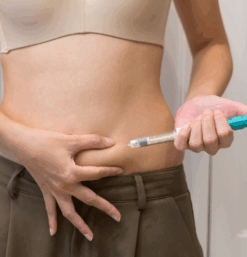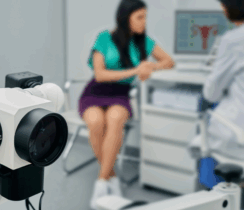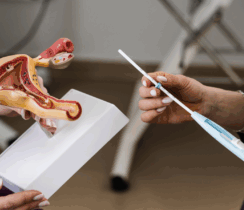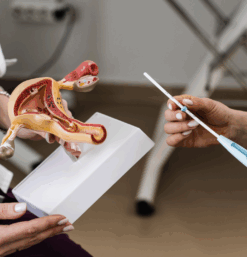In Vitro Fertilisation (IVF)
Personalised Fertility Solutions
Your IVF Pathway
We understand the hope and uncertainty that come with the journey to parenthood, especially when facing fertility challenges.
In Vitro Fertilisation (IVF) offers a path for many individuals and couples, and at NG GyneHealth, we provide a personalised approach with clinical expertise and compassionate care from consultation to embryo transfer.
IVF involves retrieving eggs, fertilising them in a lab, and transferring an embryo to the uterus. Extra embryos can be frozen for future use, offering additional chances for conception. In some cases, Intra-Cytoplasmic Sperm Injection (ICSI) can improve fertilisation, especially with low sperm count.
Whether it’s your first IVF or another cycle, we’re here to support you with care and expertise on your path to parenthood.
IVF: The Key Stages
Knowing what to expect at each stage can provide comfort and clarity. At NG GyneHealth, we believe in making the process as smooth and supportive as possible. The IVF procedure consists of four key stages, each designed to maximise the chances of successful conception while prioritising your wellbeing.
Our team will be with you every step of the way to ensure your comfort.
Here is what's covered
Step One

Ovarian Stimulation
The first step of the IVF process involves using fertility medications to stimulate the ovaries. This encourages the development of multiple eggs, increasing the chances of successful fertilisation. During this stage, you will receive regular ultrasounds and blood tests to monitor the growth of follicles, ensuring the best timing for egg retrieval.
Step Two

Egg Collection
Once the follicles are mature, a minor procedure called egg retrieval is performed. You will be sedated, and the procedure typically takes about 15-20 minutes. Using ultrasound guidance, a fine needle is used to collect the eggs from the ovaries. Patients often describe it as a quick and minimally uncomfortable procedure, with most feeling fine to resume normal activities the next day.
Step Three

Fertilisation
After collection, the eggs are fertilised with sperm in a specialised laboratory. This process can be done through traditional IVF, where eggs and sperm are combined, or through Intracytoplasmic Sperm Injection (ICSI), where a single sperm is injected directly into the egg. The fertilised eggs are then monitored for several days as they develop into embryos. Our team provides regular updates to keep you informed during this exciting phase.
Step Four

Embryo Transfer to the Uterus
Once the embryos are ready, the best-quality embryo is selected for transfer back into the uterus. This is a simple procedure, often compared to a pap smear in terms of comfort. It is usually painless and takes only a few minutes. Any remaining viable embryos can be frozen for future use, providing flexibility for future cycles.
Your Guide to IVF & Managing Stress
To support you along the way, we’ve created a comprehensive booklet that provides:
- Detailed explanations of what to expect during IVF
- Practical strategies to help manage stress and emotions throughout treatment
- Insights on coping with the pressures of fertility treatment, along with when to seek extra support
- Guidance on communicating with loved ones and your healthcare team for additional reassurance
Intra-Cytoplasmic Sperm Injection (ICSI)
Intra-Cytoplasmic Sperm Injection (ICSI) is one of the most effective assisted reproductive technologies, often paired with In Vitro Fertilisation (IVF) to increase the chances of conception. While both IVF and ICSI aim to achieve successful fertilisation, the difference lies in how fertilisation occurs. In IVF, the sperm naturally penetrates the egg, while in ICSI, a single sperm is injected directly into the egg’s cytoplasm, offering a solution for couples facing male factor infertility or previous fertilisation challenges.
Our team at NG GyneHealth is here to provide not only medical expertise but also emotional support throughout your ICSI journey. We understand the complexity of fertility treatments and are dedicated to offering compassionate care that prioritises your wellbeing.
ICSI: The Key Procedures
The procedure is carried out by highly skilled technicians using advanced micromanipulation tools, ensuring precision and the best possible chance of success. We work closely with you, providing regular updates and personal guidance as you progress through each step.
Here is what's covered
Egg Retrieval

Just like with IVF, eggs are collected from the ovaries following ovarian stimulation. This process is carefully monitored to ensure comfort and safety.
Micromanipulation & Sperm Injection

Using specialised micromanipulation tools, a single, healthy sperm is injected directly into the egg under a microscope. This direct approach helps overcome fertilisation barriers while offering a controlled, precise process. We understand that this step can feel overwhelming, but our experienced team is here to offer reassurance and answer any questions.
Embryo Development

Following fertilisation, the developing embryos are carefully nurtured in the lab for several days. You will receive regular updates about the progress of your embryos, keeping you informed and engaged in the process.
Embryo Transfer

The best-quality embryo is selected for transfer to the uterus, similar to standard IVF. This simple procedure is carried out with care, ensuring comfort and support. Any remaining viable embryos can be frozen for future cycles, providing further hope for conception.
What to Expect After Embryo Transfer

After an embryo transfer, there is a critical waiting period marked by both physical and emotional factors:
- Rest and Recovery: Rest is encouraged immediately after the procedure, though light daily activities can resume the next day.
- The Two-Week Wait: Patients must wait about two weeks to see if the embryo successfully implants. This phase can be emotionally challenging, as early pregnancy symptoms may resemble those of the hormonal medications used during IVF.
- Avoid Certain Activities: Patients should avoid strenuous activities, hot baths, alcohol, caffeine, and smoking.
- Pregnancy Testing: A blood test is conducted around 10-14 days post-transfer to confirm pregnancy, as home tests can be unreliable at this stage.
- Emotional Support: The waiting period can be emotionally demanding, so patients are encouraged to seek support from partners, family, or counsellors.
Your Guide to ICSI & Managing Stress
To support you along the way, we’ve created a comprehensive booklet that provides:
- Detailed explanations of what to expect during ICSI
- Practical strategies to help manage stress and emotions throughout treatment
- Insights on coping with the pressures of fertility treatment, along with when to seek extra support
- Guidance on communicating with loved ones and your healthcare team for additional reassurance
This booklet provides information, comfort, and practical tips for managing the emotional aspects of your fertility journey.
Download it today for valuable insights and a more supported experience.
Submit Form Information
Download Questionnaire
Contact Numbers
Make an Enquiry
Privacy
Policy
N.G. GyneHealth Care Pty. Ltd. © 2006-2025. ABN: 68 119 441 413
Web design by Beetle Digital Pty. Ltd.







